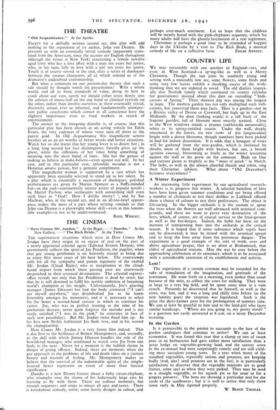COUNTRY LIFE
WE may reasonably wish one another in England—yes, and even in West Scotland—a spring-like as well as a Merry Christmas. Though the sun joins its southerly rising and setting with a miserably low arc, some flowers, some birds and some very few leaves exhibit a shocking excess of the wish- thinking that we are ordered to avoid. The old diarists (especi- ally that Norfolk family which continued its county calendar for generations) insisted about this date on recording " Indi- cations of Spring." Their shortest day was among the longest in hope. The modem garden has not only multiplied such indi- cations, but converted them into facts. Here is a garden—not in a Riviera valley of Devon or Cornwall, but high up in the East Midlands. By the door (looking south) is a tall bush of the fragrant guelder, full of blossom most sweetly scented. Close to the West windows stands a prunus (subhirtella autumnalis), white as its spring-entitled cousin. Under the wall, deeply ensconced in the leaves, are two roots of iris (unguiculata) bright with a dozen blossoms, though numbers have been picked in bud for indoor decoration. It is odds that a bouquet of roses will be gathered from the rose-garden, which is sheltered by shrubs, most of them bright with berries, but one, a broom (genista cinerea), blossoming as freely as the winter jessamine against the wall or the gorse on the common. Buds on lilac and currant gleam as brightly as the " maze of quick " in March. The larks, as well as the always cheerful thrush and robin, sing
their Christmas jubilate. What about " Old December's bareness everywhere? "






















 Previous page
Previous page